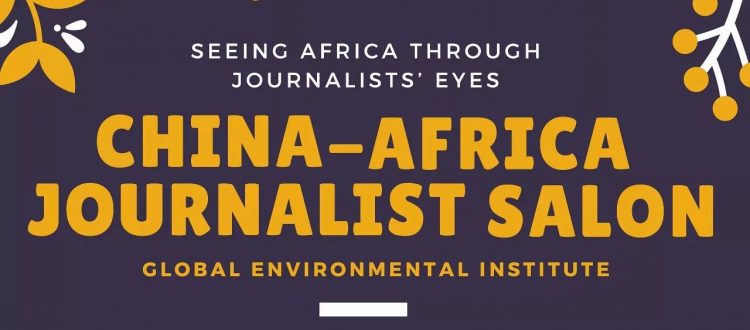Lessons on the China-Africa Environment | Journalist Salon
On December 21, 2017, over 80 people gathered at the Beijing Bookworm for “See Africa Through Journalist’s Eyes: China-Africa Journalist Salon” hosted by GEI, featuring three Chinese journalists whom have reported from several African countries including Namibia, Congo (DRC), Mozambique, and Kenya.
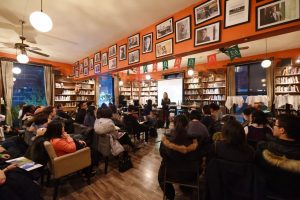
Why did GEI hold this event?
Since 2014, GEI has been conducting the China-Africa Journalist Project as part of our larger China-Africa Forest Governance Learning Platform, which specifically focuses on forest governance in four African countries, namely Mozambique, Cameroon, Uganda and Congo (DRC), and also engages stakeholders from other countries.
The China-African Journalist Project aims to build relationships between and enhance the capacity of journalists to cover issues of forest governance – including illegal timber trade, export/import regulations, deforestation and other land-based investments – between China and African nations.
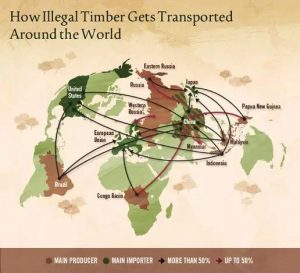
Over the past 3 years, we have held trainings for African journalists on reporting skills, like interviewing and data collection, as well as cultural awareness so that they can improve their coverage on Chinese investment and other issues. We have also supported 6 Chinese journalists to go to Congo (DRC), Cameroon and Mozambique to report on timber trade as well as other land-based Chinese investments.

During their presentations, Yi SHI (Sixthtone) and Shulun HUANG (Caixin Media) gave the audience a special inside look at being a Chinese reporter on timber trade issues in Congo (DRC) and Mozambique.

They shared the process of doing research and the challenge of establishing a network; the thrill and danger of going undercover; the surprising interviews and the funny conversations with cab drivers; and, most importantly, what they learned about the state of China’s OFDI in Congo, Mozambique and other countries in Africa.
The event’s extended Q&A session shared even more experiences and knowledge. The panel was comprised of Yi and Shulun as well as Yelin MO(Caixin Media) and GEI program officer, Jingwei ZHANG, both of whom have also traveled extensively throughout the African continent.
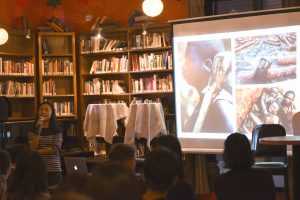
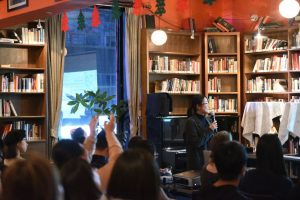
Photo Credit: GEI
Here’s a summary of what we learned!
The journalists agreed that being a foreigner, on one hand, made it difficult to build a network for interviewing and gaining access to different sites, but, on the other hand, being Chinese offered them some anonymity that was useful when reporting on the Chinese shareholders. In fact, sometimes they were mistaken for buyers of illegal timber trade and allowed to experience first-hand how the illegal timber supply chain worked.
The panel definitely agreed that the opinions depended on the specific person and country. Yelin acknowledged that he was surprised to see that some Chinese companies had exclusively hired local Kenyans to work in manufacturing. Yi also mentioned that some local people are negative towards Chinese people because of the environmental issues caused by their involvement in poorly managed timber trade. Moving forward, Shulun hopes that the relationships can become increasingly positive – one way to do this, she says, is for the Chinese sent overseas to make more effort to make friends with the local people.
The first step is to have more information about the current operations and then, improving the policies governing forestry management, timber operations and the export/import to China. It is understood that civil society, both local and international, is playing an increasingly important role. Jingwei explained that if Chinese NGOs can go abroad to key Chinese investment areas, they may help mediate communications and lessen conflicts and misunderstandings between Chinese companies and local communities.
The audience attending our event included many journalists. Together we all discussed how the coverage of ‘Africa in general’ need to become more precise. Specifically, the media should be mindful to avoid using ‘Africa’ in titles or headlines when the story is actually about one country within Africa. We also discussed important points like having more balanced coverage, and improving interview skills and data collection abilit
Deforestation is a global issue with complicated geo-political-economic motivations. In order to address the seriousness of deforestation, stakeholders across spheres – government, business, media, and the public – need to be involved.
The panelists recommend that you can help staying informed by reading credible reports (China Dialogue, Sixth Tone and Caixin are our favorites!). Also, it’s important to travel and see the the world first hand – but only buy responsibly-sourced souvenirs!

